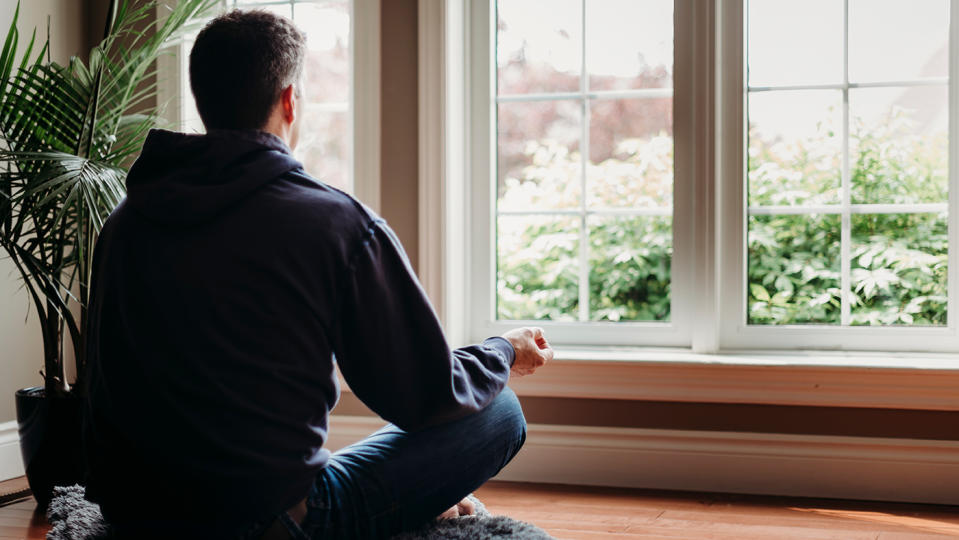These tips will help make you feel happier during this pandemic
Watch: Top tips to boost your mental health
If you feel your stress, anxiety or boredom levels are going through the roof currently, you’re not alone. The Office For National Statistics recently reported that 70% of adults in England were very or somewhat worried about the effect COVID-19 was having on their life right now. Nearly half surveyed also said their wellbeing was being affected.
With a lack of uncertainty about the future, it’s natural to feel stressed, but GP Dr Chris George says taking some small steps can help improve your mental health.
1 Let’s get physical!
Exercise, whether that’s a long walk or a more intensive HIIT workout, helps improve mental health by releasing feel-good hormones, which in turn improves your mood and stress levels.
“It doesn't matter what it is that you enjoy doing - the main thing is you're getting out there, you're doing physical activity and your heart rate is going up,” advises Dr George.
“Physical activity can be as effective as antidepressants in the treatment of mild and moderate depression.”
2 Add some colour into your diet
In times of stress, we often reach for the biscuit tin or chocolate, but Dr George says it’s actually never been more important to try and have a healthy diet.
His top tip is to include at least five portions of fruit and vegetable – and to add as much colour as you can to your daily diet.
Read more: The psychological impact of not having anything to look forward to
“They should be colourful - or as colourful as we can make them - because that increases the amount of fibre and polyphenols within our diets,” advises the doctor.
“When we eat healthy, we feel better about ourselves.”
3 Be careful about what you drink
Many people have increased how much alcohol they drink during lockdown, but according to Dr George, it’s best to step away from the booze – and the caffeine!
He says: “Try to avoid things like caffeine and alcohol in the diet, because it's going to affect symptoms of anxiety and depression.”
Read more: Men should stick to just one alcoholic drink a day
As caffeine is a stimulant, it can make your ‘flight or fight’ response more pronounced, making you more anxious, moody and unable to sleep.
Alcohol affects the neurotransmitters in your brain, which can increase symptoms of depression, anxiety and aggression, so if you use your daily vino to relax, it’s probably time to find a new hobby instead!
4 Meditate
And that new hobby could be meditation! Dr George advises everyone to try meditating daily to help boost your mood.
“Meditation can actually make us stop and take account of where we currently are,” he suggests.
Read more: Why we're turning to nostalgia to get us through lockdown 2.0
“Meditation has been shown to reduce stress by reducing a heart rate and blood pressure. Why not try two minutes a day and building up to about five to 10 minutes?”
If you’re new to meditation, try the Calm or Headspace app or search for You Tube videos to take you through guided meditation.

5 Connect with others
There’s no doubt about it, we’re seeing people less and less during this pandemic, whether that’s because of self-isolation or working from home. Connecting with others can lower anxiety and depression, help improve our self-esteem and even improve our immune system.
Dr George’s advice is to schedule time to check in with friends and family.
“We're really lucky to have a lot of technology at our fingertips,” he says. “So why not call someone using FaceTime, a phone call or even email to remain connected?”
6 Try and keep work separate
For many of us working from home has become the norm, and while many have swapped a long commute for a walk to the kitchen table, it does mean boundaries have become easily blurred between work life and home life.
Dr George says it’s important to have a physical sign that work has ended, which will then enable you to enjoy your downtime more.
Read more: Why it's OK to prioritise your mental health over your job
“If you work in a separate room, at the end of the day, close the door, so you're not thinking about work,” he suggests.
“Or if you're working from the kitchen table, make sure you clear this up off the kitchen table so that it's out of sight and out of mind.”
Watch: Easy ways to improve your sleep


